If you were an angst-laden teen in Denver in the 1980s or 1990s, you undoubtedly whiled away many late night hours drinking coffee and smoking at one of Denver’s many downtown cafes, such as Paris on the Platte, Muddy’s and the Mercury Café. The menus for these cafes that are held in DPL’s extensive menu collection offer a beguiling trip down nostalgia lane.
In a time before cell phones and the internet were ubiquitous (or even existed, really), cafes were the place to see and be seen, and to flirt with adulthood and each other. In the ‘80s and ‘90s, the denizens of this café society were mostly members of Generation X, the oft-forgotten flannel-draped middle child generation first eclipsed by Baby Boomers and later overrun by Millennials.
Gen Xers were the last generation of “free-range” kids: the children of divorce, the feral latchkey kids who felt a bit lost in the shuffle and were defined by a jaded sarcasm. Like many generations, Xers enthroned their own role models, selecting mostly awkward beautiful misfits: the Kerouacs and Plaths, Lou Reeds, Sonic Youth and Nirvana. Café society kids went in for a uniform of torn black or flannel clothing, smudged eyeliner and Doc Marten shoes.
Denver’s Gen Xers grew up in a smaller city than the one we live in today, a less populous, less glitzy, more gritty place. Real estate was not yet a topic on anyone’s radar. Nighttime left the streets of downtown eerily empty, and the ballpark and LoDo had yet to bring commerce to quiet warehouse districts. An abandoned 16th street viaduct bridge connecting the Northside to the rest of the city crumbled at one edge of downtown; South Broadway featured a collection of run-down bars and businesses at another. This neglected urban decay somehow provided an extra spark of ersatz danger so necessary to a constructed teen identity.
Every era leaves behind traces of evidence, from architecture to art. While the formal events in life are often documented, the experiences that shape us as people—family cooking, a childhood friendship, a concert that moved us—have no stone monuments to commemorate them. When we’re fortunate, snippets of these daily ephemeral moments are collected and preserved in archives.
Known as ephemera, these oft-overlooked items might include a concert ticket stub, a note tossed from a friend in class or even a menu from your favorite restaurant. Food in particular can be memory-charged, with one whiff or taste unleashing a flood of nostalgia. The menus held in the Denver Public Library’s collection are like Marcel Proust’s famous madeleine cookie, unleashing a wave of memories. We hope the menus for Paris, Muddy’s and the Mercury Cafe from our collection will do the same for you.
Paris on the Platte, the nerve center of Denver coffee houses for alternative Xer kids, operated at 1553 Platte Street from 1986 to 2015. The café shepherded the neighborhood from its earlier run-down decay to the high-rent commercial and residential neighborhood it is today. Kids were drawn to Paris at its height for the literal isolation from society and the unfinished bohemian aura of brick, metal and wood, mismatched furniture and graffitied bathrooms.
You could always find the hip crowd at Paris from dark until close at 4 a.m., saturated in coffee and the clouds of smoke. Paris was a place where one could meet like-minded people from other neighborhoods and schools, a feat sometimes challenging before the era of school choice and the internet. The other beauty of Paris was the bookstore filling a full third of the space. Specializing in the high-brow and obscure in a time where alternatives to mainstream culture were harder to come by, the bookstore exposed Denver’s teens to new ideas.
From Earl Grey shakes to the Café Fantasia, Italian sodas and their popular mud pie, the Paris on the Platte menu from DPL’s collection stirs up many memories. The menu’s insistence on a $2 minimum per person is seemingly irrelevant today, but was likely necessary to keep the place afloat when kids would table-hop and linger all night. Hours of hobnobbing and entertainment were well worth the price of entry.
Not to be overshadowed by Paris, among other popular spots were Muddy’s and the Mercury Café. Muddy Waters of the Platte predated Paris by a decade, with its first cozy café and bookstore location opening in 1975 at 2557 15th Street, just around the corner from current-day Little Man Ice Cream. The cafe closed in the mid-1980s, but by 1989, several former regulars of the old location opened “Muddy’s Java Café” at 2200 Champa (pictured above). The new Muddy’s café included a theater space, a dojo and a bookstore, and was situated just over the edge of a rougher area of town. For an interesting read on the history of both Muddy’s cafes, see Bill Stevens’s book in our collection.
Like Paris, Muddy’s was also known for its hip, down-at-the-heels atmosphere, and in addition featured regular piano and jazz music performances. One could easily imagine a modern-day Neal Cassady and crew lingering for a late night jam, coffee and cigarettes and hopes of a free meal. Together with the setting, pitchers of Café Marquis and Mexican Chocolate were a big draw. Many readers of our previous post on Muddy's commented that in fact, as homeless teens, they appreciated the owner giving them free meals regularly.
Just a few blocks away from Muddy’s stood the Mercury Café, the sole survivor of this trio in our current day. The “Merc” continues to appeal to those of a more whimsical hippie bent, and they were ahead of their time in offering local, organic, vegetarian food at a time when most of the city was still fixated on steak. The Mercury Café opened at 2199 California Street on Halloween 1990, after several short-lived iterations in Capitol Hill in the years prior. Hosting a higher percentage of adults in their clientele, in the 1980s and 90s the quirky Merc featured food from early morning brunch clear through to munchies fare in the wee hours of the morning.
A glance at our historic Merc menu shows offerings ranging from omelettes and sandwiches to Mexican and Chinese dishes. Of our three cafes, the Merc had the most diverse, and robust, food menu. Their coffee drinks were less elaborate than others’, however they featured alcoholic coffee drinks bearing names of astrological signs, and if memory serves right, they’d make a virgin version upon request.
In keeping with this diversity, the Mercury Café has always featured poetry readings, and a large performance space for local and soon-to-be globally-popular bands (the 90s saw Black Flag, the Dead Kennedys, Soul Asylum, Green Day). Our ephemera collection includes listings for regular drop-in tango, African and swing dancing lessons, and—according to the April 1982 performance calendar we hold in the collection—the “People’s Free Theatre” featuring open mic performances. Our copy of the 1986 menu also features quotes from Omar Khayyam’s Rubaiyat, prosaically perhaps to fill out the 8-page fold, but more poetically to remind us all of our place in the universe.
For the "old school crowd" still walking these Denver streets, and for those who've joined us since, we're lucky to have held onto the Mercury for more than thirty years.
------------------------------------------------------------------
The menus from this post are part of a much larger assortment of printed menus from restaurants chiefly located in Denver, broader Colorado and the Western United States. The collection is currently being processed and will have a new online research guide soon. If you're interested in viewing the collection (WH1509), please contact Western History & Genealogy staff.
If you’re thirsty for more coffee house nostalgia, you’ll enjoy some of our other resources featuring these cafes and others:
- Western History Subject Headings
- Denver Public Library Digital Collections
- Denver Newspaper Clippings Files:
- Denver. Restaurants
- Denver. Theatres. Mercury Cafe
- Muddy’s Chronicles: Memoirs from the Last Great Coffeehouse
- Muddy’s Café: An Important Denver Institution

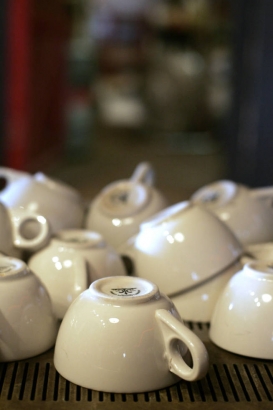
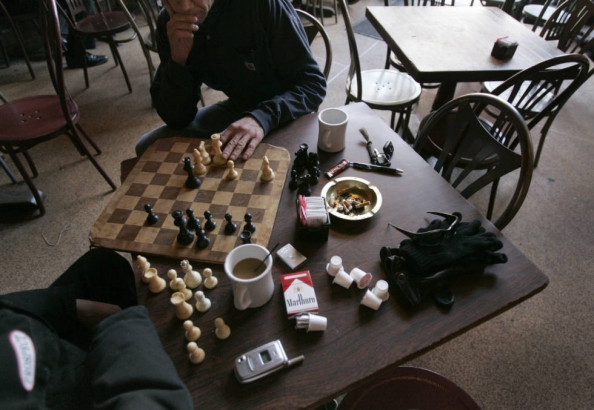
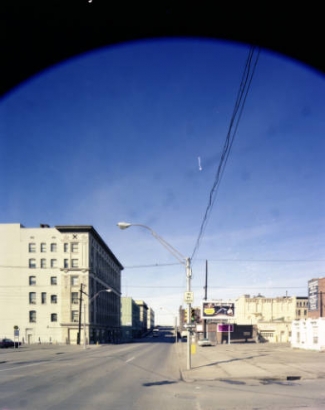
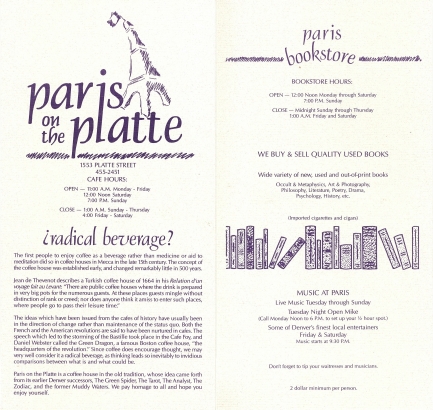
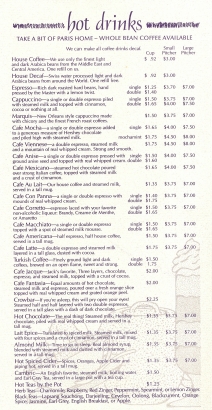
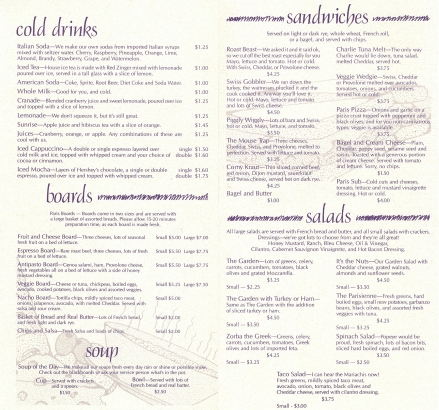
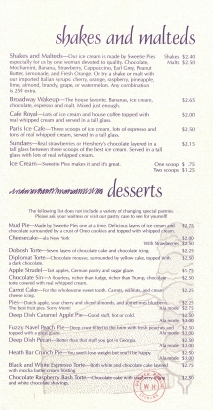
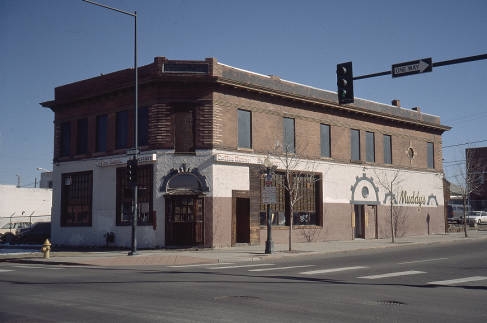
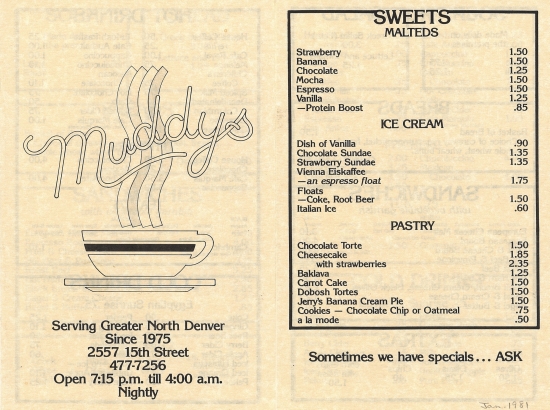
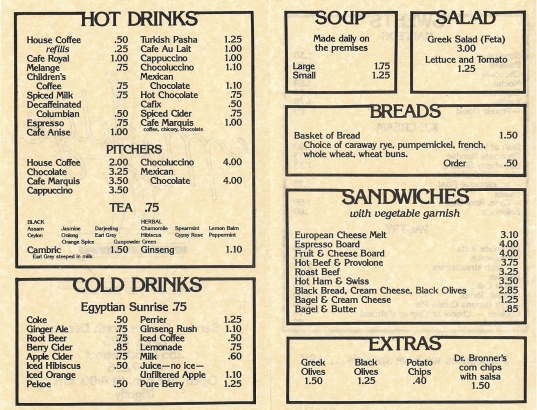
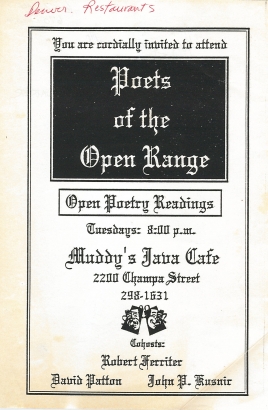
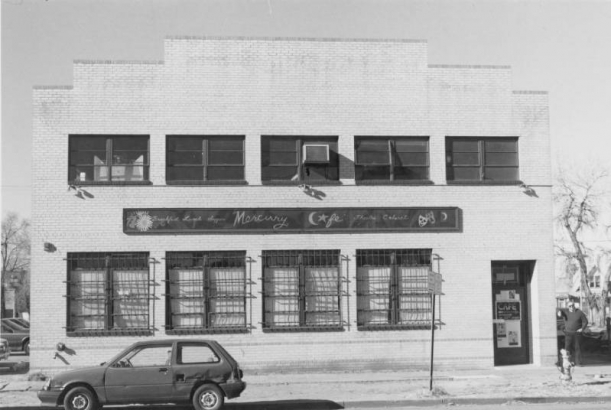
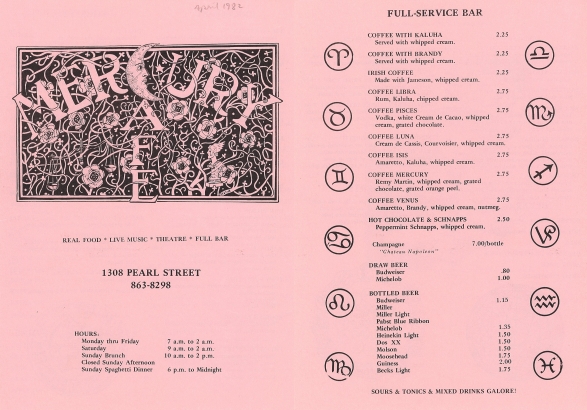
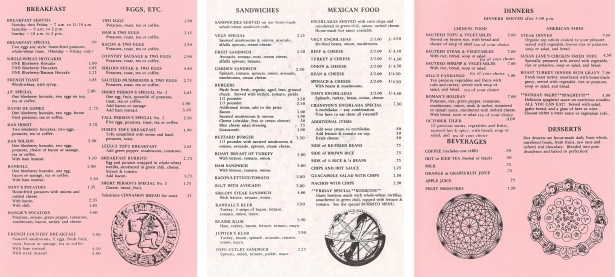
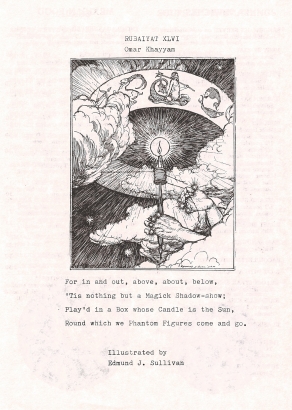
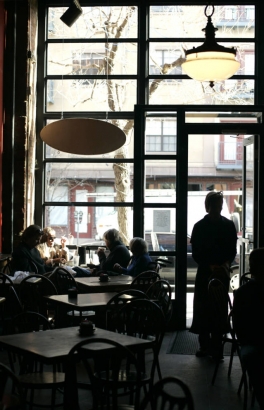
Comments
If I can remember that far
If I can remember that far back, an Egyptian Sunrise consisted of hot apple cider, hibiscus tea and a slice of orange. Divine! Thanks for the memories!
I used to hang out in the
I used to hang out in the back room at Muddy's where the jukebox was (I think there was a pool table), and I remember people would always play the same really long Sisters of Mercy song because it was the best bang for their quarter or whatever.
Hibiscus tea and apple juice
Hibiscus tea and apple juice that's an Egyptian Sunrise
Paris was my 2nd home
Paris was my 2nd home sometimes my only home.
We used to call the guy that
We used to call the guy that ran the bookstore at Paris Conan the librarian he was a big mean-looking guy but actually the nicest guy you could meet.
Anyone know whatever became
Anyone know whatever became of all the portraits that used to hang on the walls of Muddys. There was one of me for a long time.
I remember visiting Cafe
I remember visiting Cafe Nepenthes frequently in the mid- to late-70s. They often organized belly dance performances there, and I was one of the performers. Such fond memories of this wonderfully off-beat establishment.
Thanks for this article, I
Thanks for this article, I have fond memories of Muddy's on the Platte with its bohemian vibe. I recall an older-than-teenage clientele and lots of college-age artsy types hanging out there late at night when I did in the 70's. I remember the funky used book store next door, too. I didn't realize that the cafe hadn't been there long when my friends and I frequented it. It appeared aged, but ageless!
Yes to all the spaces above.
Yes to all the spaces above. Does anybody remember Cafe Euphrates? On 17th near Vine I believe. A lot of sorta ok high school bands used to be able to get a show there
:)
Yes to all the spaces above.
Yes to all the spaces above. Does anybody remember Cafe Euphrates? On 17th near Vine I believe. A lot of sorta ok high school bands used to be able to get a show there
:)
Add new comment